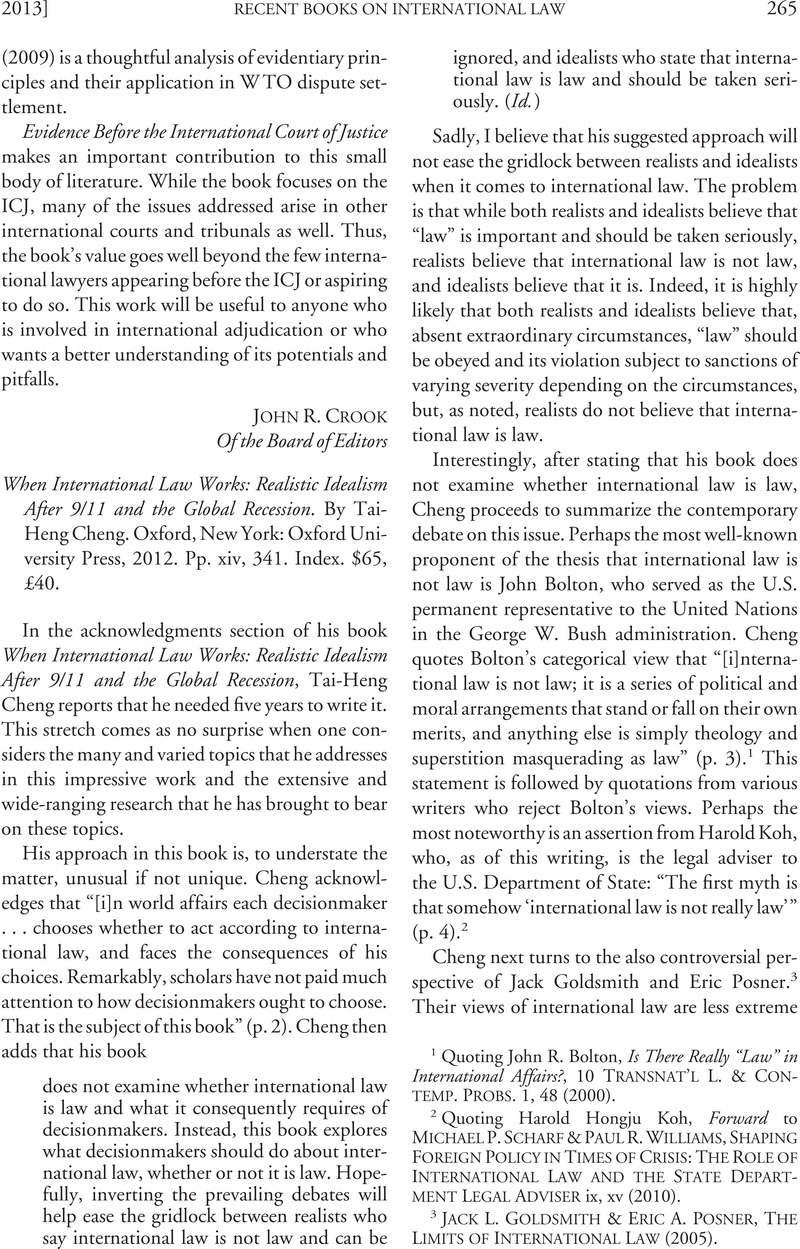No CrossRef data available.
Article contents
When International Law Works: Realistic Idealism After 9/11 and the Global Recession. By Tai-Heng Cheng. Oxford, New York: Oxford University Press, 2012. Pp. xiv, 341. Index. $65, £40.
Published online by Cambridge University Press: 20 January 2017
Abstract

- Type
- Recent Books on International Law
- Information
- Copyright
- Copyright © American Society of International Law 2013
References
1 Quoting Bolton, John R., Is There Really “Law” in International Affairs?, 10 Transnat’l L. & Contemp. Probs. 1, 48 (2000)Google Scholar.
2 Quoting Harold Hongju Koh, Forward to Michael P. Scharf & Paul R.Williams, Shaping Foreign Policy In Times of Crisis: The Role of International Law and The State Department Legal Adviser ix, xv (2010).
2 Jack L. Goldsmith & Eric A. Posner, The Limits of International Law (2005).
4 I have stated that “Jack Goldsmith and Eric Posner suggest, implicitlyifnot explicitly, that customary inter national law does not exist.” Murphy, John F., The Evolving Dimensions of International Law: Hard Choices For The World Community 3 (2010)Google Scholar.
5 Quoting Goldsmith & Posner, supra note 3, at 197.
6 Quoting id. at 203.
7 Scharf & Williams, supra note 2.
8 For example, former U.S. SecretaryofState Condoleezza Rice is quoted as saying, “This Department, along with the rest of the Bush Administration, will be a strong voice for international legal norms, for living up to our treaty obligations, to recognizing that America’s moral authority in international politics also rests on our ability to defend international laws and treaties” (p. 4 n.13 (quoting John B. Bellinger III, The Bush (43rd) Administration (2005–2009), in Scharf & Williams, supra note 2, at 135–36 (quoting Rice state ment))).
9 See, e.g., Symposium, International Law in Crisis, 44 Casew. Res. J. Int’l L. 1–441 (2011)Google Scholar. Fora book by a nonlawyer that sheds some light on reasons for the crisis, see Ian Bremmer, Every Nation for itself: Winners and Losers in a G-Zero World(2012).
10 See Murphy,supra note 4.For a roadmap through the book, see David P. Stewart, Book Review, 104 AJIL 688 (2010).
11 See Glennon, Michael J., The Fog of Law: Self-Defense, Inherence, and Incoherence in Article 51 of the United Nations Charter, 25 Harv. J. L. & Pub. Pol’y 539, 540 (2002)Google Scholar. It should be noted that I disagree with Glennon’s conclusion. Murphy, supra note 4, at 137–38.
12 See Hathaway, Oona, Do Human Rights Treaties Make a Difference?, 111 Yale L. J. 1935 (2002)CrossRefGoogle Scholar. For a response to Hathaway challenging her thesis, see Goodman, Ryan & Jinks, Derek, Measuring the Effects of Human Rights Treaties, 14 Eur. J. Int’l L. 171 (2003)CrossRefGoogle Scholar.
13 See J. Kelly, Patrick, The Twilight of Customary International Law, 40 Va. J. Int’l L. 449 (2000)Google Scholar.
14 Id. at 469 –75.
15 Kelly, J. Patrick, International Law and the Shrinking Space for Domestic Politics in Developing Countries, in Law and Rights: Global Perspectives On Constitutionalism and Governance 259, 261 (Andrews, Penelope E. & Bazilli, Susan eds., 2008)Google Scholar.
16 See Brown, Chester, Book Review, 61 Int’l & Comp. L.Q. 785, 785 (2012)CrossRefGoogle Scholar.
17 See D’Amato, Anthony A., A Reformulation of Customary International Law, in International Law Anthology 72–73 (D’Amato, Anthony ed., 1994)Google Scholar.
18 John F. Murphy, The United States and The Rule of Law In International Affairs 19 (2004).
19 For discussion of this debate, see, for example, id. at 154–61.
20 Id. at 159–61.
21 See id. at 161.
22 Sadly, a substantial measure of truth exists in the biting critique of Zbigniew Brzezinski, former U.S. national security adviser:
[T]he painful realityis that the bombing campaign has been conducted as if the human lives at stake shouldbe priced at three different levels: The most precious lives are those of the NATO pilots, with military tactics explicitly designed to minimize their loss; next are those of Milosevic’s officials, whose headquarters have been targeted only when empty; least valuable are the lives of the Brzezinski, Kosovars Z., Compromise over Kosovo Means Defeat, Wall St. J. Europe, May 25, 1999, at 14, quoted in Louis Henkin Et Al., Human Rights 737 (1999)Google Scholar.
23 See Brown, supra note 16, at 785.
24 See supra note 5 and accompanying text.
25 Austin, John, The Province of Jurispru Dence Determined 77–80, 126 (Campbell, David & Thomas, Philip eds., 1998) (1832)Google Scholar.
26 See Hathaway, Oona & Shapiro, Scott J., Outcasting: Enforcement in Domestic and International Law, 121 Yale L.J. 252, 284–90 (2011)Google Scholar.
27 Military and Paramilitary Activities in and Against Nicaragua (Nicar. v. U.S.), Merits, 1986 ICJ Rep. 14 (June 27).
28 For both critical and favorable views, see the series of articles in Appraisals of the ICJ’s Decision: Nicaragua v. United States (Merits), 81 AJIL 77 (1987).
29 Loewen Group, Inc. v. United States, ICSID No. ARB(AF)/98/3 (NAFTA Ch. 11 Arb. Trib. June 26, 2003), 42 ILM 811 (2003).
30 For discussion of this resolution, see Murphy, John F., Responsibility to Protect (R2P) Comes of Age? A Sceptic’s View, 18 ILSA J. Int’l & Comp. L. 413, 428–34 (2012)Google Scholar.
31 In a book review in this Journal, Cheng lists his affiliation with a private law firm, whereas previously he had been a professor of law at New York Law School. Tai-Heng Cheng, Book Review, 106 AJIL 710, 715 (2012).




